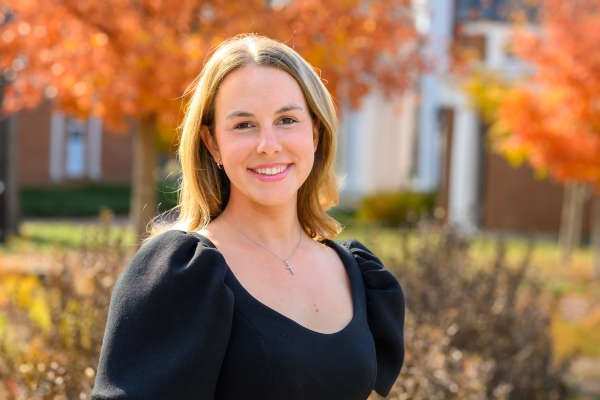W&L Outcomes: Kathleen Roberts ’24 Roberts is pursuing her doctorate in educational psychology through the LIME program at Southern Methodist University in Dallas.

Kathleen Roberts ’24
Major: Cognitive and behavioral science and Spanish double major
Hometown: Dallas
What will you be doing after graduation?
I will be attending Southern Methodist University as an educational psychology Ph.D. student under Dr. Leanne Ketterlin Geller in the Simmons School of Education and Human Development. With Dr. Geller, I have also been selected for the Leaders Investigating Mathematics Evidence (LIME) program, a four-year, fully funded Ph.D. sponsorship grant awarded by the U.S. Department of Education Office of Special Education Programs.
How did your career plans evolve over the course of your time at W&L?
I knew I was interested in psychology coming into my first year, but I was not sure in what capacity. After taking Principles of Development with Dr. Megan Fulcher, I knew I wanted to pursue child psychology. Through research projects in Dr. Fulcher’s child development research lab on campus and in other CBSC courses like Data Science Trends with Dr. Holly Shablack, I was able to explore this field more and found an interest in educational psychology.
What internships or other summer experiences did you partake in, and how did those experiences shape you and your career plans?
The summer after my sophomore year, I worked as a teaching assistant at a school in Dallas called It’s a Sensory World Academy. This school serves children with developmental disorders who need a smaller class and more personalized attention from their teachers. I had little previous experience working with neurodivergent children before, and working as a teaching assistant also helped my desire to work in the field of education, especially for children with disabilities. The summer after my junior year, I spent six weeks in Copenhagen, Denmark, where I took courses on developmental disorders as well as Scandinavian parenting and education styles. Seeing how smaller countries have made strides in educational practices and how they differ from the traditional school model in the United States was a unique and interesting experience.
How did the Office of Career and Professional Development support you, and which resources did you find most helpful?
When it came to the process of applying to graduate programs, the CPD office resources and Canvas page were extremely helpful models and starting points for the materials I needed to submit in my applications. Having access to this database of resources at all times through the Box folders allowed me to work on my applications during breaks in my day or at night, which helped me to balance my coursework and my applications.
What did you study at W&L, and what are some skills or learnings you will take from your academic experience into the professional world?
At W&L, I was a cognitive and behavioral science and a Spanish double major. While the majority of my graduate education and future career path lie in the field of CBSC, I am also glad I took courses in Spanish for the practical application of using the language on the job, as well as creating an insight into some of the linguistic aspects of educational psychology. Having the opportunity to work in Dr. Fulcher’s research lab has prepared me to join other labs while in graduate school with experience in running participants, coding data and presenting our findings, which are skills many undergraduate students do not have the opportunity to learn.
What clubs, organizations, athletic teams or other extracurriculars were you involved in that had an impact on you?
As a member of Kathekon, the student-alumni relations organization, I really enjoyed getting to meet W&L alumni and hearing about their path from the freshman residence halls to where they are now. Since I will be attending graduate school instead of starting a career, it was nice to hear about all of the ways W&L alums have not only pursued their interests in the working world, but also how their own experiences and connections from W&L shaped them.
Who or what has inspired you along the way?
The main reason I came into W&L wanting to study psychology was because of my grandfather, who was a child and adolescent psychiatrist in Dallas for over 40 years. Hearing stories of past patients or how he prescribed the correct intervention to help his patients seemed like solving a new puzzle with every patient, and a career field I wanted to follow him in.
What career-related advice would you give to next year’s graduating class?
My best advice to next year’s graduating class, particularly if you are unsure what you want to do after graduation, is to start with your class work to find more specific interests. If there was an article you read that left you thinking and asking questions, go back to it and try to look up more about the subject. Your professors pick a variety of materials for each class, and the odds that you’ve found a greater interest in something is very likely and a great place to start when thinking about future careers.

You must be logged in to post a comment.